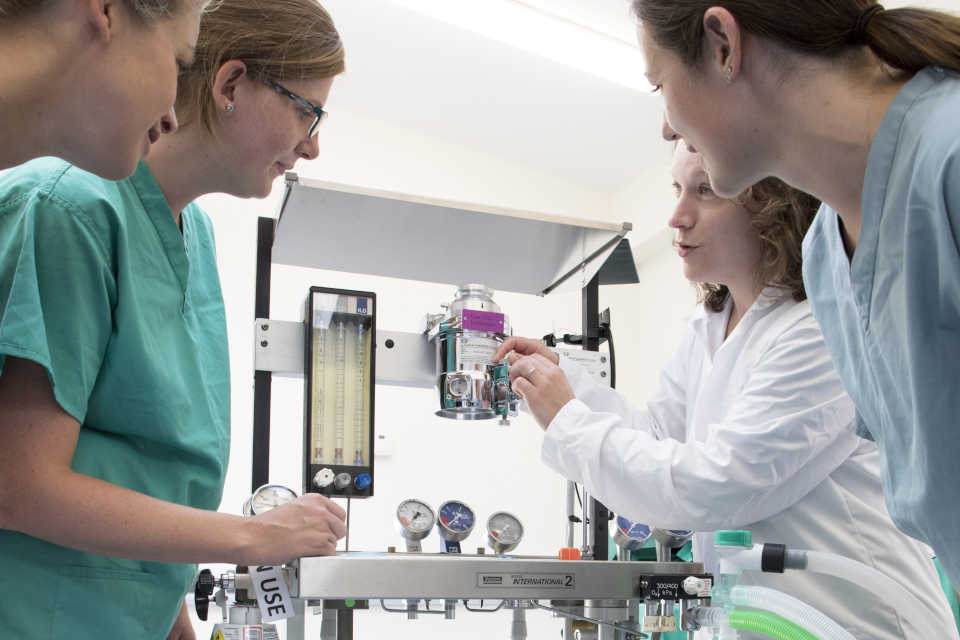Veterinary Medicine and Surgery - BVetMS
Achieve your ambition to pursue a career in the exciting and rewarding field of veterinary medicine and surgery. We offer a unique delivery model that combines the expertise and resources of two outstanding universities enabling you to develop into a dedicated and compassionate veterinary professional.
Year of entry
- 2025
Course type
- Single Honours
UCAS code
- D100
Duration of study
- 5 years
Why study Veterinary Medicine and Surgery at Keele University?
Teaching Excellence Framework GOLD
Keele University has been awarded the highest rating of gold in the teaching excellence framework (TEF), 2023. The TEF assessment identifies excellence in the educational experience and outcomes of our students, focusing on all undergraduate courses and students.

Additional opportunities
There are a range of additional opportunities available when studying this course.
Please note, undertaking one may impact upon the availability of another.
Entry requirements
The following section details our typical entry requirements for this course for a range of UK and international qualifications. If you don’t see your qualifications listed, please contact us to find out if we can accept your qualifications. If you don't think you'll meet the entry requirements specified, you may be able to gain entry to this course via a Foundation Year.
Additional information
For Entry Requirements for Veterinary Medicine, please see the Harper Keele Vet School Veterinary Medicine course page.
A wide range of qualifications are considered suitable for entry onto the course. For further information please contact the Harper Keele Veterinary School admissions team: admissions@hkvets.ac.uk
English language requirements
All of our courses require an English language qualification or test. For most students, this requirement can be met with a 4 or C in GCSE English. Please see our English Language guidance pages for further details, including English language test information for international students. For those students who require an English language test, this course requires a test from .
Alternative and contextual offers
We're committed to ensuring equality of opportunity to all our applicants with the potential and motivation to succeed, regardless of background. That's why we operate a range of alternative offer schemes with clear eligibility criteria, including contextual offers, offers for those studying within the Keele region, and recognising a range of additional qualifications in your offer.
General information
The entry grades outlined in this section indicate the typical offer which would be made to candidates, along with any subject specific requirements. This is for general information only. Keele University reserves the right to vary offer conditions depending upon a candidate's application.

Foundation year
Our Foundation Year provides an excellent alternative route to Keele, providing a unique opportunity to better prepare for your chosen degree, and with guaranteed entry onto your undergraduate course once you successfully complete your Foundation Year.
This extra year of study can improve your academic skills, expand your subject knowledge, give you a better understanding of higher education and, perhaps most importantly of all, build your confidence.
Keele University is consistently ranked among the top universities for student satisfaction, and we have over 70 years' experience of teaching a foundation year to students. On the Keele Foundation Year, you'll study on campus, joining our undergraduate community from the outset, with access to all the facilities and support that you'd get as an undergraduate student at Keele.
The information in this Foundation Year section is for UK/Home applicants. Where an international Foundation Year is available, please see the 'Information for international students' tab.
Our Foundation Year allows you to develop your critical thinking, academic reading, writing, and communication study skills along with subject-specific knowledge and skills which will be invaluable in your academic studies and beyond. Upon meeting the progression criteria and successfully completing our Foundation Year, you will be eligible to transfer to the Bachelor Veterinary Medicine and Surgery (BVetMS) degree at Harper & Keele Veterinary School.
This Foundation Year is a two-semester programme which provides a tailored pre-degree programme of study to better prepare you for the Bachelor of Veterinary Medicine and Surgery (BVetMS). For example, the Foundations of Life Sciences module looks at basic cell biology in terms of structure and function and go on to examine how cells obtain their energy and raw materials. It considers how organisms interact and analyses the effects of climate change on ecosystems.
Find out more about the Keele Foundation Year, including information about teaching and assessment methods by visiting the Foundation Year homepage.
The module details given below are indicative, they are intended to provide you with an idea of the range of subjects that are taught to our current students. The modules that will be available for you to study in future years are prone to change as we regularly review our teaching to ensure that it is up-to-date and informed by the latest research and teaching methods. The information presented is therefore not intended to be construed and/or relied upon as a definitive list of the modules available in any given year.
Semester One Modules
| FYO-00185 | Practical and Academic Skills in Science | 15 credits |
| FYO-00211 | Foundations in Numerical and Quantitative Methods for Scientists | 15 credits |
| FYO-00197 | Foundations of Life Sciences | 15 credits |
| FYO-00189 | Foundations in Chemistry | 15 credits |
Semester Two Modules
| FYO-00199 | Advancing Life Sciences | 30 credits |
| FYO-00271 | University Research Portfolio | 30 credits |
Foundation Year Entry Requirements
The entry grades outlined in this section indicate the likely offer or range of offers which would be made to candidates along with any subject specific requirements. This is for general information only. Keele University reserves the right to vary offer conditions depending upon a candidate’s application. Read more about our undergraduate entry requirements for United Kingdom, European Union and International students.
Applicants wishing to progress onto Bachelor of Veterinary Medicine and Surgery (BVetMS) are required to have:
A Levels
- GCE A Level grades ABC/BBB - please note this is not a suitable route if you have taken, or are currently studying both A Level Biology AND Chemistry
BTEC
- DDM
International Baccalaureate
- H5,H5,H5 or 30 overall - please note this is not a suitable route if you have taken, or are currently studying, both Higher Level Biology AND Chemistry
Access to HE
- Obtain Access to HE Diploma with 122 UCAS Tariff pointS including a minimum of 30 L3 credits at Distinction. Must not be taking Biology AND Chemistry. And, if the gap between commencement of the Diploma and prior formal study is at least three years, the minimum GCSE requirement is each of Maths, English Language and Science GCSE grades B/6
GCSE Requirements
- Normally a minimum of 5 GCSEs at A/7 including Science and Additional Science (or Biology and Chemistry) with at least B/6 in English Language; Maths and Physics (if taken as a separate GCSE). If you do not have this GCSE profile please contact Admissions for further guidance on admissions@keele.ac.uk.
Please note to progress on to this programme from the foundation year, students will be required to pass the Veterinary Medicine and Surgery selection event and successfully complete the Foundation Year at the required threshold grades of 70% in each semester 2 module. Students will also need to have the following work experience; 2 weeks in a vets practice and 4 weeks in an animal environment. The selection event will take place during the Foundation Year.
Please note that the Foundation pathway for Bachelor of Veterinary Medicine and Surgery (BVetMS) is not a suitable route for those applicants that have completed/ are completing GCE A Level Biology.
If you wish to apply for the Foundation pathway for Bachelor of Veterinary Medicine and Surgery (BVetMS) please state this in the further details box in the choices section of your UCAS application form and also in your personal statement.
How to Apply
Students will need to apply for BSc (Hons) Bioveterinary Science with Foundation Year (UCAS code D103) through UCAS at www.ucas.com. Applicants need to state that the application is for the Bachelor of Veterinary Medicine and Surgery (BVetMS) course in the further details box in the choices section of the UCAS application form and in your personal statement.
Direct Entry Students
If you are a UK student, already have your qualifications, are not expecting any further results and only wish to apply to Keele, please contact the Admissions Office directly.
The information in this Foundation Year section is for UK/Home applicants. Where an international Foundation Year is available, please see the 'Information for international students' tab.
We also offer a January start for some of our Foundation Year courses. Adopting a blended learning approach, the January start is particularly useful for students wishing to return to education following time out of studying, or who are seeking a flexible approach to their Foundation Year studies. Our January start is available across most of our Science, Humanities, Social Science and Business courses.
Whilst still being a full-time course, our blended delivery model combines live teaching sessions - both online and on-campus - with self-directed study, enabling you to predominantly study at a time that suits your lifestyle. You will benefit from weekly online taught sessions which encourage you to engage with your teachers and peers.
In addition to online study there will be a series of full study days that you will be required to attend throughout each semester. These sessions may include lab-based activities, group work, review of course and assessment materials studied online. They will emphasise opportunities for you to deepen your knowledge and understanding of your chosen route.
Please refer to the September start tab for more information about the entry requirements and what you will study. The modules that you will take on a January start Foundation Year will be similar to those for the September start, but on a compressed timescale and tailored to a blended learning approach (with the majority of learning taking place online).
For more information, including fees, the UCAS code for this course, how to apply, and how you will be taught, please visit our January Start Foundation Year webpage.
Our International Foundation Year is delivered on campus through Keele University International College (KUIC). Find out more about the International Foundation Year options on the KUIC website.
Our Foundation Year provides an excellent alternative route to Keele, providing a unique opportunity to better prepare for your chosen degree.
This extra year of study can improve your academic skills, expand your subject knowledge, give you a better understanding of higher education and, perhaps most importantly of all, build your confidence.
Upon meeting the progression criteria and successfully completing our Foundation Year, you will be eligible to transfer to the Bachelor Veterinary Medicine and Surgery (BVetMS) degree at Harper & Keele Veterinary School.
Keele University is consistently ranked among the top universities for student satisfaction, and we have over 70 years' experience of teaching a foundation year to students. On the Keele Foundation Year, you'll study on campus, joining our undergraduate community from the outset, with access to all the facilities and support that you'd get as an undergraduate student at Keele.
Discover the Keele difference
Everything’s on your doorstep at Keele, and you’ll soon feel at home and make friends wherever you go.
We help students manage their money and ensure that they receive any funding for which they may be eligible.
Make yourself more employable after graduation by taking advantage of the whole host of additional opportunities.





